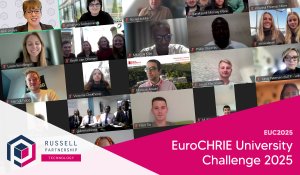Best PhD Student Paper Award 2018
Emerald Publishing and the Dublin Institute of Technology are together sponsoring the 2018 Best PhD Student Paper Award.
This award is given to a superior research paper submitted by a PhD student. Nominees were:
- Technology Disruption and Shifting Perceptions: A Dynamic Change Perspective on how Employees Make Sense of Technology-driven Organizational Change in Dutch Tourism Industry
Annemiek H.T. van der Schaft, Xander Lub, Omar Solinger and Beatrice van der Heijden NHTV University of Applied Science, Vrije Universiteit Amsterdam & Radboud University - The Role of Emerging Tourism Networks and Rural Cluster Development: A Wild Atlantic Way Perspective
Kelly O’Sullivan Browne, Sophie Price and Fiona Tobin Institute of Technology Tralee, Margaret Linehan, Cork Institute of Technology - Virtual Reality Presence as a Preamble Experience: The Role of Mental Imagery
Vanja Bogicevic, Soobin Seo, Jay Kandampully, Stephanie Q. Liu and Nancy A. Rudd Ohio State University & Washington State University
Kelly O’Sullivan-Browne winner of the 2018 PhD Best Paper Award
The EuroCHRIE conference held in Dublin in November this year was an excellent event on many levels for me personally. Over the course of the week I met many other PhD students from Ireland and from around the globe, got to hear lots of really interesting research on a myriad of topics from “hostmanship” to food tourism. I also got to present my research in front of EuroCHRIE discerning delegates which was both nerve-racking and exciting. It is great to get asked questions on your favourite topic! I was really thrilled to receive best PhD paper at this year’s event. I would like to thank Denise O’Leary in DIT, Fevzi Okumus and Mathilda Van Niekerk International Journal of Contemporary Hospitability Management and Emerald Publishing for the award.
Biography:
Kelly O’Sullivan is an Irish PhD Candidate whose research “Rethinking Network Dynamics: A Model for Rural Tourism”, is a mixed methods approach to investigating the development of rural tourism clusters, which has particular resonance for rural communities in remote towns and villages in Ireland. The supervisory team are Dr Sophie Price, Senior Lecturer, Institute of Technology Tralee and Prof Margaret Linehan, Head of School in Cork Institute of Technology. The research aims to understand the role of tourism networks in providing effective locally-led responses to tourism development and their part in driving a local agenda of inter-firm collaboration, a key ingredient of competitive destinations. She recently won the prestigious award of Best Conference Paper at 14th Annual Tourism and Hospitality Research in Ireland Conference (THRIC) hosted by Waterford Institute of Technology, in June 2018.
Kelly holds a Diploma in Advertising and PR from The Fitzwilliam Institute, Dublin, a Degree (Ord) in Hotel Management (Block Release) from Galway Mayo Institute of Technology (GMIT) and 1st Class (Hons) Degree Bachelor of Business with Marketing from IT Tralee. In 2016, Kelly was awarded a scholarship from IT Tralee, County Kerry Ireland to pursue a Masters by Research (M Phil.) with the Irish Academy of Hospitality and Tourism, successfully transferring to the doctoral track in May 2018. Kelly has gained an extensive range of experience during her career working across several different sectors, including hospitality, events, advertising and media, local government and the rural SME retail sector
Abstract: Rethinking Network Dynamics: A Model for Rural Tourism Cluster Development
Kelly O’Sullivan-Browne*, Dr Sophie Price*, Professor Margaret Linehan**
*Irish Academy of Hospitality and Tourism (IAHT), Department of Hospitality, Tourism and Culinary Arts, IT Tralee, **Faculty of Business and Humanities, Cork Institute of Technology
The Wild Atlantic Way is a Fáilte Ireland tourism strategy to promote the coastal areas on the west coast to stimulate the local economies through rural tourism development. The challenges of developing meaningful tourism in peripheral places are multifaceted and interlinked, manifesting in pervasive and persistent seasonality, scarcity of visitor facilities, and uncoordinated local responses. Tourism clusters and their networks have been identified as a counterbalance to these constraints. However, the process of network formation, its benefits and success factors have not been fully explored in the context of rural tourism, and little is known about the relationship that exists between collaboration and network participation.
This paper addresses these gaps and presents findings from a mixed methods concurrent inquiry into the phenomenon of emerging rural tourism clusters along the Wild Atlantic Way route, exploring the moderating role of local tourism networks in nurturing collaboration, including their success factors and perceived benefits. Data collected through purposive sampling of 101 micro-tourism rural firms, across 5 early stage networks, was analysed through structural equation modelling was complemented by 6 in-depth interviews with network insiders. The research presents a conceptual model of rural tourism, underpinning the significant role of networks in regional tourism, due to their considerable influence over the process of inter-firm collaboration, knowledge exchange and inter-firm support. Findings suggest that internal network dynamics, including, but not limited to, leadership, access to resources and governance have a substantial impact on the effectiveness of the network to be a stimulus for tourism development in a rural context. The identification of the causal relationships and the moderating influence of networks leads to exciting prospects for rural destination development and recommends a shift in emphasis in policy towards supporting the process of tourism network formation and development through facilitation and capacity building rather than action-outcome orientated funding as is currently the situation.
Key Words: Rural tourism, network participation, inter-firm collaboration, rural tourism networks, structural equation modelling (SEM), mixed methods

















